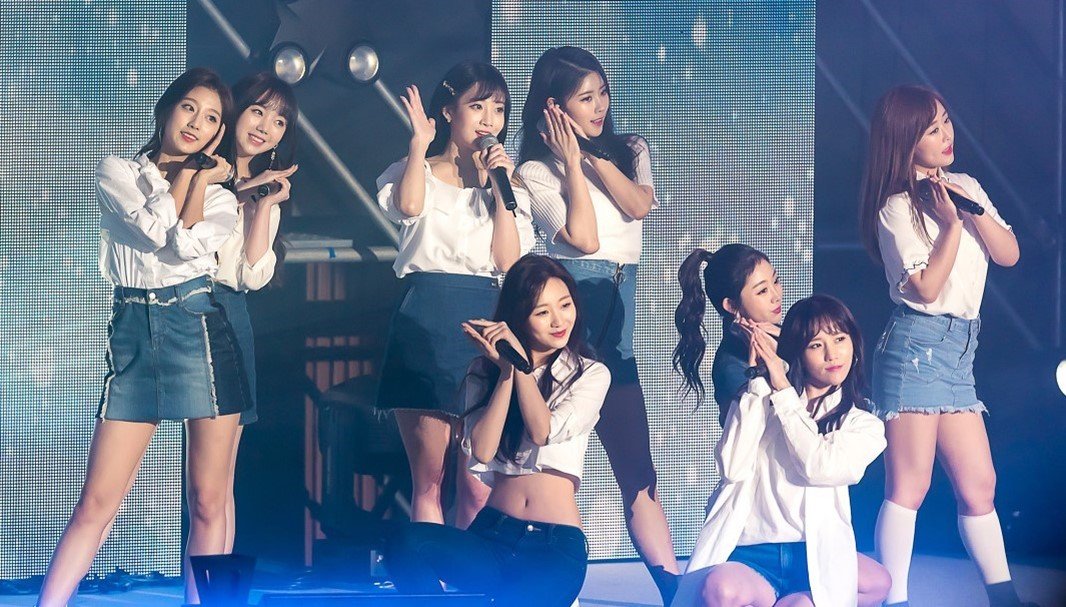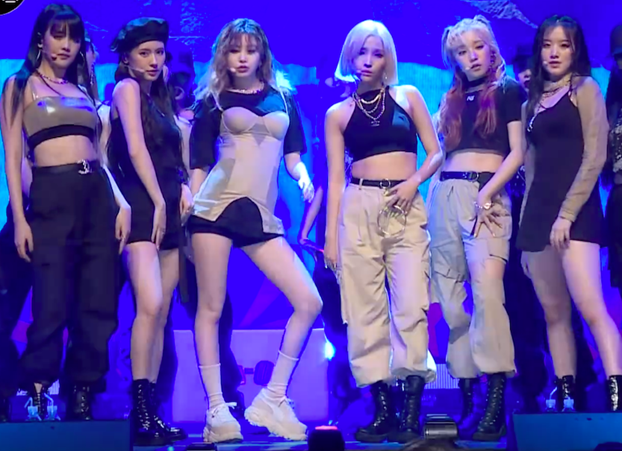Is the K-pop Industry Toxic for Women? A Feminist Perspective of the K-pop Industry
By Kathryn Lee (she/her)
Content warning: xenophobic comments, discussions of racism and harassment
Twice (McJoun - Wikimedia Commons)
Do you like K-pop? If so, which K-pop group is your favourite? Mine is New Jeans for their energetic music, the angelic vocals of group member Hanni, and their baggy gen-z style fashion, which is a refreshing departure from the original K-pop outfits of short skirts for the male gaze. I also appreciate that they embrace their natural beauty, unlike other idols who've gone through extensive plastic surgery. The K-pop industry is promoting patriarchal ideologies such as harmful beauty standards, unrealistic body image and gender stereotypes which impacts fans globally.
Harsh Realities of Beauty Standards
Body modification to meet beauty standards is common in many parts of Southeast Asia. This is fueled by the societal notion that physical appearance (particularly skin colour) is reflective of social status. Body modification is seen as economically beneficial as appearing of higher social standing can increase job (and even marriage) prospects.
Although people have the right to choose to alter their appearance, the choice is heavily biased when image and worth are so strongly associated.
The proliferation of body modification amongst K-pop idols further contributes to this.
K-pop Idol IU - (Yoon Min-hoo - Wikimedia Commons)
K-pop fans in Southeast Asian countries have tried to bleach their skin to fit into the Korean beauty standard. This method is extremely dangerous as it causes health risks of skin burning and cancer. IU, a K-pop Idol has undergone skin whitening injections so she can fit into the Korean beauty standard.
Gaby Dwidjaya suggests ‘Colorism plays a role as Korean culture views light skin/other Eurocentric features as the standard. They often look down upon darker skin tones as it is viewed as unattractive.’ (Gaby Dwidjaya, 2020).
Ahmad Dahlan finds ‘K-pop girl figures are often displayed with ideal body standards, such as having a slim body, white skin, thin face, and high nose, thus making fans adore and want to have a physical appearance like their idol.’ (Ahmad Dahlan, 2021).
YouTube is filled with videos speculating on what procedures K-pop idols have undergone.
Modern beauty standards have been described as pedophilic as they mimic child-like features such as big eyes, narrow nose, slim body, no wrinkles, and no body hair. K-pop idols often uphold this concerning standard by undergoing procedures such as nose implants, nostril size reduction, jaw shaves, double eyelid surgery and blepharoplasty (‘eye lift’).
Lovelyz k-pop group (슈퍼스타☆김케이 - Wikimedia Commons)
Idols are expected to conform in order to maintain their status, however conformance further contributes to the toxic culture. K-pop idols are so named because they are meant to be the idolised ideal. The consequences of the perpetuation of unrealistic beauty standards can negatively impact the mental health of young fans and influence them to undergo invasive and potentially dangerous procedures.
As a K-pop fan, I felt excluded as I didn't conform to these body ideals. But now, I've embraced and loved my natural body, refusing to compare myself against those unrealistic standards.
Societal Awareness of Racial Discrimination in South Korea
My beloved K-pop group, BLACKPINK, has unfortunately faced xenophobic hate comments, primarily targeting Lisa, due to her Thai ethnicity.
Lisa from BLACKPINK (슈퍼스타☆김케이 - Wikimedia Commons)
In a YouTube video called ‘What Nobody Understands About Blackpink's Lisa’ Kooklielit explains ‘Lisa was targeted by hurtful comments as people shamed her visuals and background. One commented “With makeup on she totally looks like a Russian elf…But with darker hair and no makeup she looks like any average Thai woman”. It angered Lisa's fans’ (KOOKIELIT, 2021).
Toxic fans dislike Lisa because she is not Korean and her appearance doesn’t conform to Korean beauty standards, but this doesn’t stop her from pursuing her career as an Idol. Lisa's experience with racism has brought more awareness about racial prejudice within South Korean society.
The comment comparing Lisa to a ‘Russian elf’ and making derogatory remarks about her ethnicity is xenophobic. Harmful comments like these can impact fans who admire and support Lisa, and especially those whose appearance, like Lisa’s, differs from the standard. It can cause anger and emotional distress within the fan community.
(G)I-DLE showcases Feminist Values
(G)I-DLE K-pop group (Play大明星 - Wikimedia Commons)
My favourite lyrics from the song ‘Tomboy’ are ‘Do you want a blond Barbie doll? It's not here, I'm not a doll.’ These lyrics express a rejection of the patriarchal belief of submissive femininity that is forced upon women. (G)I-DLE 's message challenges current anti-feminist and incel movements. In the ‘Tomboy’ music video, (G)I-DLE showcases an exit from the traditional cute, ‘natural’ K-pop makeup. The group chose a smoky eye and edgier expression. The song ‘Tomboy’ strongly rejects the traditional ‘innocent’, child-like feminine appearance, embracing alternative expressions of femininity.
Routledge shows ‘(G)I-DLE released a song entitled Tomboy, which went viral for its outrageous music video delivering a bold statement about women being independent, fearless, and abandoning toxic heterosexual relationships.’ (Routledge, 2022).
Conclusion
Gender inequality is common in South Korea, and unrealistic beauty standards further contribute to this. Fans across the globe are actively harmed by the extreme beauty ideal perpetuated by the K-pop industry pushing an impossible standard and a dangerous ‘remedy’. Even idols themselves, like Lisa from BLACKPINK, face the consequences of not fitting this ideal. The toxic ideal of the perfect female form harms women’s self-image, opportunities, and even physical health, and ultimately prevents the advancement of equality. To create a more inclusive and feminist culture, we must challenge harmful beauty standards, separate appearance from worth, and promote diversity.
Got a feminist opinion you want to share? We want to publish your work! Anyone can contribute to the OWP blog, no experience necessary! Find out more about being featured on our blog.
Sources
Dahlan, A. (2021, August). Celebrity worship and body image among young girls fans of K-pop girl groups. Humanitas Indonesian Psychological Journal. http://repository.ubaya.ac.id/40110/3/Monique_Celebrity%20worship%20and%20body%20image%20among%20young%20girls%20fans%20of%20K-pop%20girl%20groups%20%28Humanitas%20Vol.%2018%20%282%29%2C%20August%202021%29.pdf
Dwidjaya, G. (2017). Societal Norms within K-POP. UW Tacoma Digital Commons. https://digitalcommons.tacoma.uw.edu/gender_studies/69/
File:180412 포항시민콘서트 러블리즈 (1).jpg - Wikimedia Commons. (2018, April 12). https://commons.wikimedia.org/wiki/File:180412_%ED%8F%AC%ED%95%AD%EC%8B%9C%EB%AF%BC%EC%BD%98%EC%84%9C%ED%8A%B8_%EB%9F%AC%EB%B8%94%EB%A6%AC%EC%A6%88_%281%29.jpg
File:IU MelOn Music Awards 2017 04.jpg - Wikimedia Commons. (n.d.). https://commons.wikimedia.org/wiki/File:IU_MelOn_Music_Awards_2017_04.jpg
File:Lisa BLACKPINK PUBG Mobile Sept 2020 ad.png - Wikimedia Commons. (2020, September 28). https://commons.wikimedia.org/wiki/File:Lisa_BLACKPINK_PUBG_Mobile_Sept_2020_ad.png
File:Twice in 2017.jpg - Wikimedia Commons. (2017, December 16). https://commons.wikimedia.org/wiki/File:Twice_in_2017.jpg
File:(여자)아이들 (G)I-DLE Uh-Oh Showcase 01.png - Wikimedia Commons. (2019, June 26). https://commons.wikimedia.org/wiki/File:%28%EC%97%AC%EC%9E%90%29%EC%95%84%EC%9D%B4%EB%93%A4_%28G%29I-DLE_Uh-Oh_Showcase_01.png
KOOKIELIT. (2021). What Nobody Understands About Blackpink’s Lisa [Video]. https://www.youtube.com/watch?v=5Hggu4AtyAM&ab_channel=KOOKIELIT. https://www.youtube.com/watch?v=5Hggu4AtyAM&ab_channel=KOOKIELIT
Lin, X. (2017, December). Does K-pop Reinforce Gender Inequalities? Empirical Evidence from a New Data Set. Asian Women. http://e-asianwomen.org/xml/12430/12430.pdf
Ngwe, G. (2023). The Senegalese Idol Making Blackswan One of the K-Pop’s Most International Girl Groups. JoySauce. https://joysauce.com/the-senegalese-idol-making-blackswan-one-of-the-k-pops-most-international-girl-groups/
Peterson, J., & Australia, B. J. P. F. D. M. (2022, August 24). K-pop’s biggest new girl group NewJeans has TWO Australian members. Mail Online. https://www.dailymail.co.uk/tvshowbiz/article-11140437/K-pops-biggest-new-girl-group-NewJeans-TWO-Australian-members.html
Routledge. (2022). “Yea I’m a f* Tomboy”: “girl crush,” postfeminism, and the reimagining of K-pop femininity. Taylor & Francis. https://www.tandfonline.com/doi/abs/10.1080/10350330.2022.2150542
Sun, Q., Pajé, D., & Lee, H. (2022). “Female empowerment is being commercialized”: online reception of girl crush trend among feminist K-pop fans. Feminist Media Studies, 1–14. https://doi.org/10.1080/14680777.2022.2154820







